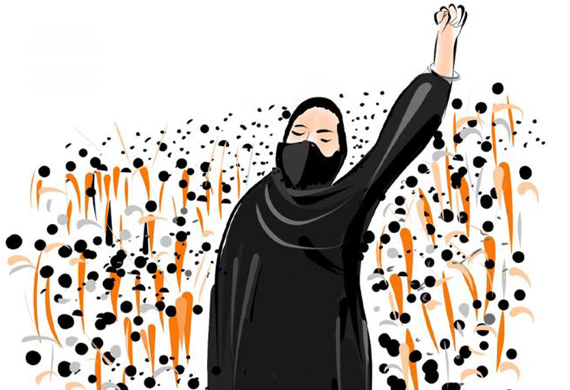
Scope of Indian Muslim Women in Education
By: Sruthi, Writer, WomenEntrepreneurIndia
Once Nobel Laureate Malala Yousafzai said, “If you want to go forward, you have to give education to girls. And once you educate girls, you change the whole community. You change the whole society.” Education is the single most effective weapon for achieving social and economic improvement. The Right to Education Act (RTE Act) ensures that every Indian child has an equal and fair chance to access free and compulsory primary education. A well-educated population with appropriate knowledge and talent is required not only for economic growth to occur, but also for growth to be inclusive, because the educated and competent individual will benefit the most from increased job opportunities. According to recent research, females benefit the most from increased job opportunities. Education is more vital for social and economic advancement than male education.
Families in the lower strata of society, in particular, send their boy children to school, but not their girls. Parents who do not send their daughters to school confront this quandary. Second, it is common for parents to send their male children to better schools, particularly in metropolitan regions. Women's education liberates them from ignorance, boosts their self-esteem, and prepares them to manage their own lives and steer the advancement of their families.
Privilege Status of Muslim Women in India
In patriarchal India, girls have fewer benefits and a lower social status than boys. Muslims, the country's largest minority group, accounting for 14.23 per cent of the population, lag well behind in important human development indicators. On the other hand, Muslim girls and women trail behind their male counterparts and women from all other communities. Traditionally, only a limited number of girls are admitted to school, and many are left out. Due to traditional cultural beliefs, many girls are unable to attend school.
According to Islam, "a mother's lap is a child's first school." In terms of the right to education, there is no distinction between men and women. Both are encouraged to continue their education. Indeed, all of the Quranic verses referring to education and supporting knowledge acquisition were addressed to both men and women, but unfortunately, Muslims remain one of the country's most educationally backward tribes. Muslim women and girls lag behind their male counterparts as well as other women. Muslims have a dropout rate of 17.6 per cent, which is higher than the national average of 13.2 per cent. As many as 25 per cent of Muslim youngsters aged 6 to 14 have never attended school or have dropped out. Only one of the 25 undergraduate students and one of the 50 postgraduate students are enrolled at one of the country's top institutions. Muslims make up a small proportion of all courses, especially at the postgraduate level, and are very marginally represented in the science stream.
Reason of Low Literacy Rate among Muslim Women
It is often found that Indian Muslims have failed to adapt to the changes that are occurring in Indian society as a whole.
The societal restraints that Muslim women face are the root cause of their illiteracy. Families bow to social conventions and prohibit girls from acquiring an education under the pretence of cultural and religious pressure. Many people assume that Muslim women are forbidden from attending school. Islam, on the other hand, prioritises and supports seekers of knowledge and makes no distinction between men and women. The Prophet stated that "whosoever follows a path to seek knowledge shall walk the path of paradise."
Despite the religious emphasis on education, many houses prohibit women from learning, alleging religious restraints and exhibiting their ignorance of their own faith. Religious leaders must also educate the community on the necessity of women's education. It's important to remember that education provides information and the ability to think, but has nothing to do with religious beliefs or practises.
Another obstacle that stops Muslim women from completing their education is early marriage. Many families marry off their daughters while they are young, and as a result, the girls drop out of school. When the institution of marriage is under attack in today's culture, there is even more need for families to educate a female child and prepare her to be financially self-sufficient if the need arises. Many educated women have forsaken their schooling in order to marry. Parents and family elders must make a solid decision on the girl's education before marriage. Only by working together as a society will we be able to educate women who will determine the future of children.
Hijab Controversy in Udupi
A controversy has erupted in coastal Karnataka over women's hijab, or headscarf. Six female students at the government-run PU College for Girls in Udupi were barred from attending sessions because they wore headscarves. On December 31, 2021, the students staged a protest, claiming that the institution had denied them access to classes for the previous 15 days. Raghupathi Bhat, an Udupi BJP MLA who leads the college's development committee, met with parents and other stakeholders. Throughout the lecture, he urged students to adhere to the college's dress code. Six students chose to quit the class. The pupils complained to the Karnataka High Court as well as the National Human Rights Commission.
In Conclusion
A limited number of educated Muslim women who hold positions as teachers, officers, leaders, physicians, architects, engineers, and journalists illustrate that if given the opportunity, Muslim women may excel in any field of study. The government, religious leaders, elected officials, and society at large are all accountable for addressing and insuring the education of Muslim women. Therefore, we need to emphasise more on the Muslim woman’s education as their rise will ultimately benefit the country also.






